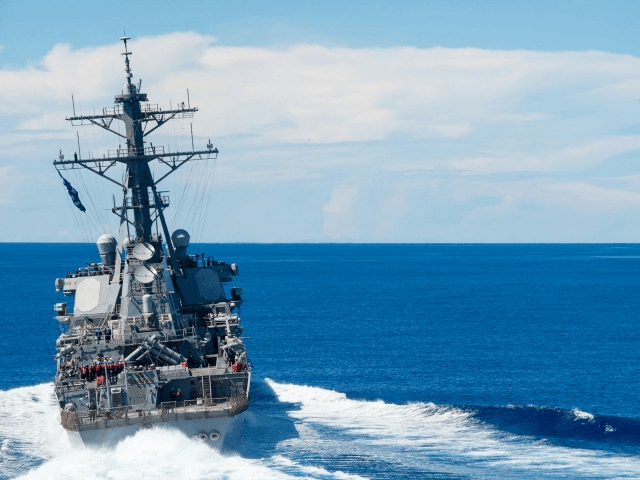The U.S. Navy announced its latest Freedom of Navigation Operation (FONOP) in the South China Sea on Friday, as the guided-missile destroyer USS John S. McCain “asserted navigational rights and freedoms in the vicinity of the Paracel Islands, consistent with international law.”
China claimed air and naval units of its People’s Liberation Army (PLA) “tracked, monitored, and warned off” the American ship.
Friday marked the first FONOP of the new U.S. administration. The U.S. Navy routinely sends warships through areas illegally claimed by China to demonstrate America’s commitment to the freedom of navigation for all nations. The Chinese generally respond by claiming they chased the American ship away. China’s state-run Global Times claimed the PLA “expelled” the “trespassing U.S. warship.”
USS John S. McCain sailed near the Paracel Islands, which China refers to as the Xisha Islands. The 7th Fleet described the operation as routine, and explained at some length why it was necessary:
The United States upholds freedom of navigation as a principle. As long as some countries continue to assert maritime claims that are inconsistent with international law as reflected in the 1982 Law of the Sea Convention and that purport to restrict unlawfully the rights and freedoms guaranteed to all States, the United States will continue to defend those rights and freedoms. No member of the international community should be intimidated or coerced into giving up their rights and freedoms.
China, Taiwan, and Vietnam each claim sovereignty over the Paracel Islands. All three claimants require either permission or advance notification before a military vessel or warship engages in “innocent passage” through the territorial sea. Under international law as reflected in the Law of the Sea Convention, the ships of all States –including their warships –enjoy the right of innocent passage through the territorial sea. The unilateral imposition of any authorization or advance-notification requirement for innocent passage is not permitted by international law. By engaging in innocent passage without giving prior notification to or asking permission from any of the claimants, the United States challenged these unlawful restrictions imposed by China, Taiwan, and Vietnam. The United States demonstrated that innocent passage may not be subject to such restrictions.
The U.S. Navy statement went on to explain why the type of territorial baseline China has drawn around the Paracels, and most of the South China Sea, is illegal under international law.
“By conducting this operation, the United States demonstrated that these waters are beyond what China can lawfully claim as its territorial sea, and that China’s claimed straight baselines around the Paracel Islands are inconsistent with international law,” the Navy said.
The Chinese military responded by accusing the USS John S. McCain of “seriously infringing upon China’s sovereignty and security,” as well as “deliberately disrupting the good atmosphere of the South China Sea of peace, friendship, and cooperation.”
The John S. McCain reached the South China Sea by passing through the Strait of Taiwan on Thursday, a passage the U.S. Navy also presented as demonstrating America’s “commitment to a free and open Indo-Pacific,” and which China also denounced as provocative.
“China has closely followed and grasped the situation of US warships passing through the Taiwan Strait. China will continue to maintain a high level of alert at all times, respond to all threats and provocations at all times, and resolutely defend national sovereignty and territorial integrity,” announced Chinese Foreign Ministry spokesman Wang Wenbin on Thursday.
“It is hoped that the United States will play a constructive role in regional peace and stability, not the other way around,” Wang added.

COMMENTS
Please let us know if you're having issues with commenting.